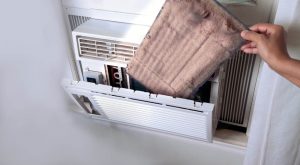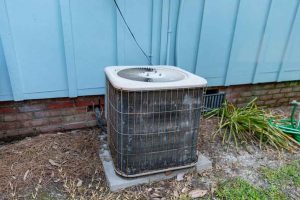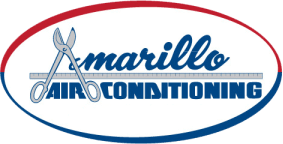Why Does My AC Unit Smell? Common Odors and What They Mean

Summer highs of 90°F call for dependable air conditioning in your Amarillo home. However, a bad AC smell can get in the way of a comfortable home. If you’re wondering why your AC unit smells, read on to learn some common causes of air conditioner smells and signs that it’s time for professional AC repairs from the team at Amarillo Air.
Musty or Mildew Smell
The most common cause of a musty smell is mold growth inside your AC. In some cases, standing water in your AC can create a moist environment where mold and mildew like to grow. The drain pan and evaporator coils are two areas most prone to mold growth.
If you have central AC, there’s also a possibility of mold and mildew inside your ductwork. This requires a full duct cleaning as well as cleaning the AC unit to remove any potential growth.
Burning Smell
A burning smell coming from your AC can indicate a potential fire hazard, so this is considered an air conditioner emergency. If you smell burning, turn off your AC immediately and call for emergency repairs.
Burning smells are a common sign of air conditioner failure, although there are several potential causes. In some cases, the issue may be mechanical, such as a belt or other component that has slipped out of place and is rubbing against another part. Other issues can include electrical problems, such as a short circuit or frayed wire.
Rotten Egg or Sulfur Smell
A strong odor of rotten eggs or sulfur usually indicates a gas leak. Natural gas is odorless in its regular state, so gas providers add a smell to help people detect a gas leak.
Gas is highly flammable, posing a risk of fire or explosion if left unfixed. If you smell rotten eggs or sulfur coming from your air conditioner, turn off the system, evacuate, and call for repairs promptly. It’s also recommended to open your windows and air out your home if it’s safe to do so.
Dirty Sock Smell (a.k.a. Dirty Sock Syndrome)
A smell like dirty socks or old laundry typically indicates bacterial growth in your air conditioning system. Similar to the musty smell, dirty sock odor can mean standing water in your drain pan that’s creating a growth environment.
Another common place for bacteria to grow in your system is in clogged or dirty air filters. ENERGY STAR recommends cleaning your air filters at least once a month and changing them every three months or as recommended by the manufacturer.
Chemical or Sweet Smell
A sweet or chemical smell may indicate a refrigerant leak in your AC. Refrigerant is the substance inside your AC that facilitates the heat transfer process. Normally, refrigerant stays consistent inside your AC, but damage or wear and tear can lead to low refrigerant levels.
While refrigerant is necessary for AC operation, it’s toxic to health if it leaks out of the system. A refrigerant leak may only have a very mild or subtle smell, so it’s not always easy to detect. Other common indicators of a refrigerant leak include the AC failing to properly cool your home or liquid pooling on or around your AC.
Refrigerants are a health hazard, so it’s important to call a professional immediately if you suspect a leak. If you smell a sweet, chemical smell coming from your AC, turn off the system and evacuate your home.
Troubleshooting Bad Air Conditioner Smells
Discover the source of the bad smell coming from your AC with these troubleshooting tips.
Change the filters

The first step with almost any AC issue is to clean or change the filters. While changing your filters every three months is a helpful guideline, you may need to change the filters more often during the heavy use season, or if you live with pets or in a dusty environment.
Inspect the drain pan
Check for leaks or standing water in your AC drain pan. Start by locating the drain pan, which is an AC component typically found in the indoor unit underneath the evaporator coils. When condensation forms on the coils, the drain pan collects this water, and the drain line moves it outside to prevent leaks and water damage in your home.
The drain pan should be dry, or it may have a tiny amount of moisture in it. However, there shouldn’t be noticeable standing water or leaks. If you notice either of these, you may need an HVAC pro to clean the lines and check for other issues causing excess moisture.
Conduct a visual inspection around the unit

Walk around your indoor and outdoor units and check for anything out of the ordinary. When inspecting the outdoor unit, look for debris, plant matter, or signs of animals near the intake vent. In some cases, insects or animals may enter your ductwork, which can lead to bad smells.
Next, inspect the indoor unit. Look for signs of moisture, heavy condensation, or liquid pooling on or around the unit. If you see pools of liquid, it’s important not to touch them — it could be a refrigerant leak, which is dangerous when touched or inhaled. These liquids can help your AC pro diagnose the problem, so leave them alone and call an expert who can safely handle cleanup and repairs.
When To Call a Professional for AC Smells
It’s important to call a professional immediately if you smell burning, rotten eggs, or a sweet, chemical smell coming from your AC. Electrical fires, gas leaks, and refrigerant leaks all pose a serious health hazard that needs emergency repairs.
Other smells like dirty socks or a musty odor aren’t an emergency, but it’s still a good idea to get them checked out by a pro. Bacterial and mold growth reduce your indoor air quality and can impact respiratory health if left unchecked. If a bad AC smell persists after you change your air filters, call a pro for AC maintenance or repairs.
Contact Amarillo Air for AC Repairs in Amarillo, TX
Notice a bad smell when you turn on your AC? Discover a quick solution with professional AC repairs from Amarillo Air. Our pros are on hand to solve all your AC issues, from bad smells to poor cooling power. Contact us to book your assessment today.
Frequently Asked Questions
How can I prevent bad AC smells?
The easiest way to prevent bad AC smells is to stay up to date on filter changes and annual maintenance. Aim to change your filters at least once every three months, and schedule a routine AC check-up at least once a year to check for potential breakdown risks.
Can bad AC smells make me sick?
In some cases, bad AC smells do pose a health risk. A smell like rotten eggs means a gas leak, while a sweet chemical smell indicates a refrigerant leak. Both of these substances are highly hazardous to health.
Other smells, like dirty socks or a musty odor, usually mean mold or bacteria. These aren’t a health crisis, but they do impact your indoor air quality and can make you sick if left unfixed.
Is it expensive to fix a smelly AC?
The cost to repair a smelly AC depends on the cause of the smell. Some issues, like a dirty drain pan or clogged filters, are relatively quick and inexpensive to fix. However, a serious refrigerant leak may require a significant repair or AC replacement, which is more costly.
CONTACT Amarillo Air Conditioning, Inc.
100% Satisfaction
Our installation technicians are the best in skill, attitude and workmanship. They will care for your home and complete the job with speed and precision. They will not wear shoes on your carpets. They will clean up when they are finished and take personal responsibility for your satisfaction. They will not smoke or swear in your home and they are drug-free. If, when they have finished in your home, they have not performed in accordance with these high standards, we won't consider the job done until you are satisfied with the results.
